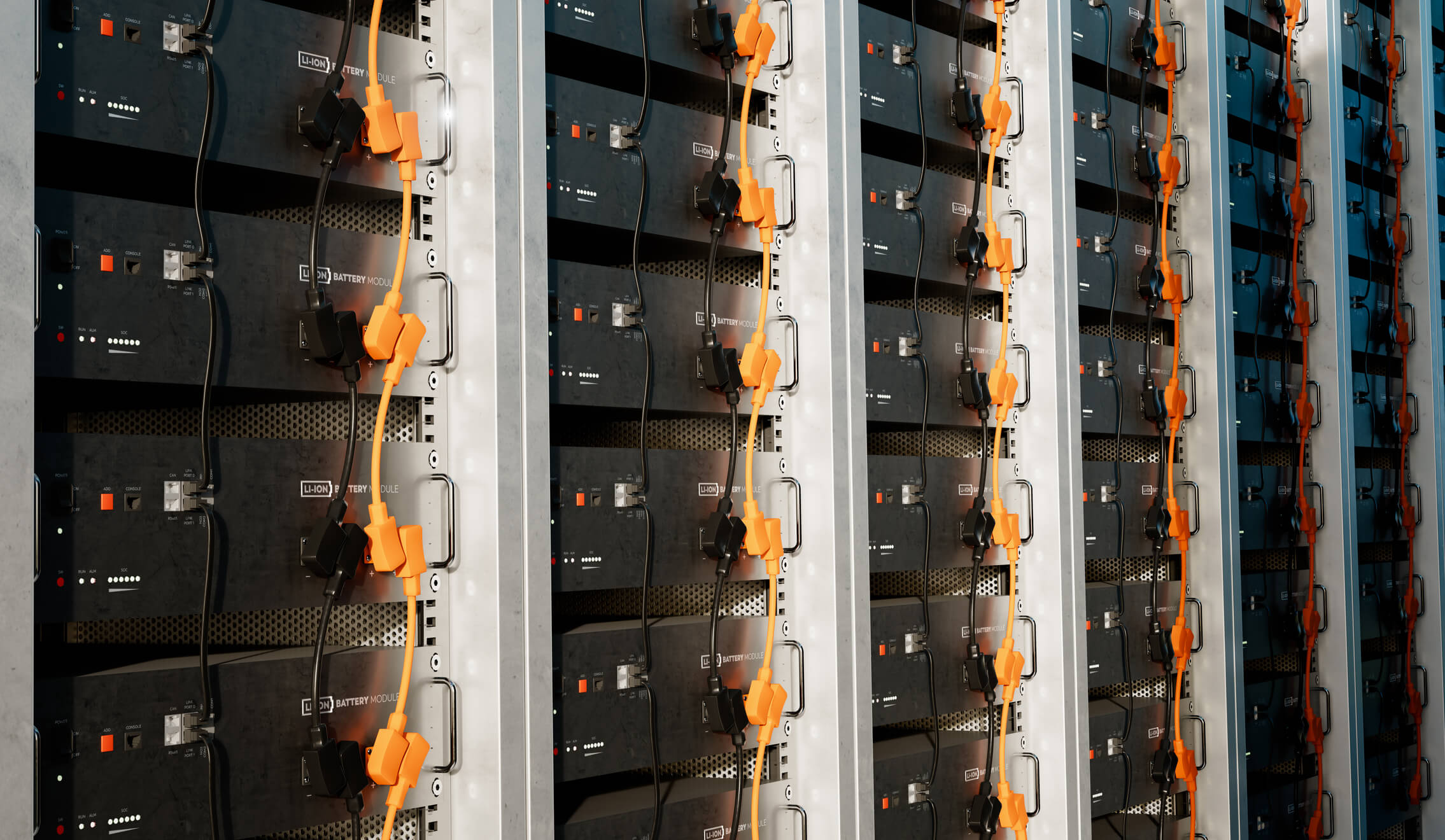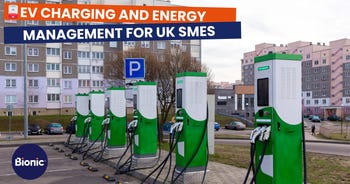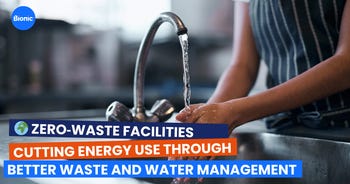What are energy storage solutions?
In 2020, the UK government relaxed legislation around energy storage, specifically battery storage - making them easier to build. This means that there are now far fewer barriers when it comes to adopting renewable energy solutions for businesses.
The UK government estimates that technology like battery storage systems, among other heat and transport technologies, could save the UK energy system up to £40 billion by 2025 and ultimately reduce businesses’ energy bills.
There are all sorts of energy storage systems on the market that are suitable for both domestic and business use. In this energy guide, we’ve covered what you need to know about energy storage as a small business owner to see if it’s an option for your business.

30 Second Summary
- Any renewable energy generated can be stored for later use with an energy storage system. This makes them great for businesses who have a high demand for energy during period periods. Businesses can leverage battery energy storage systems to charge at off-peak hours, providing energy security and reliability during the workday.
- Ion batteries are the most commonly used for battery energy storage. They have many benefits including high efficiency, they're rechargeable and last a long time.
- As with any type of battery, they will eventually need to be disposed of. This raises concerns over environmental impacts if we continue to increase battery usage. There are also issues around the mining and chemicals used in batteries, as they can be harmful to our health.
- Businesses who want to install such a system, should carefully consider their requirements and get in touch with a professional company for proper installation.
What is energy storage?
Energy storage is simply the act of taking energy that is produced and storing it to be used at a later date. Depending on the type of energy source, there are different ways that it can be stored.
For example, chemicals can be contained with hydrogen, thermal energy can be kept in thermal hot water storage, and electrochemicals can be stored in batteries. There are all sorts of types of batteries that can be used to store electricity, but lithium-ion batteries are the most widely used.
How does energy storage work?
When it comes to storing electricity, large battery systems are linked up to renewable energy systems like solar panels and microturbines that take some of the energy produced and store it for use at a later date, like when it’s a dark or cloudy day.
Battery storage systems use advanced technology that tracks and controls when to store and then release energy, making it useful for businesses that have a high demand for power at specific times. Using complex algorithms, they can determine when peak hours arise and make sure there is enough power to keep things up and running. It can also be wired into energy management software to help with efficient energy usage.
Uses of energy storage for SMEs
If you own a small café, then it’s likely you’ll need a lot of electricity to power up the mid-morning coffee rush. Some appliances drink energy, like coffee machines, toasters and dishwashers, and they’ll need to be used at the same time, creating a surge in demand for power.
And if your small business runs on renewables, then a battery storage solution can make sure you continue to serve customers without any power interruptions. It also reduces reliance on the grid which could see your supply mixed with other non-renewable energy.
Find out what makes up the UK’s energy mix with our guide.
What is battery energy storage?
Energy battery storage solutions or systems (BESS) are large battery units that are used to store a renewable energy supply. They are mostly used for on-site businesses that need electricity at specific times, want a backup power supply or operate independently from The National Grid.
The most common type of commercial batteries used are lithium-ion batteries, and there are two types on today’s market, but they operate in similar ways:
- Lithium nickel manganese cobalt batteries (NMC)
- Lithium iron phosphate batteries (LFP)
These batteries can store a lot of energy and are nearly 100% efficient, as these types of batteries are used in electric cars.
Why is battery energy storage important?
Not only is battery storage important for keeping the lights on for businesses, but it’s also an important incentive for businesses to invest in green energy and generate their own electricity.
Traditionally, in the UK, The National Grid manages surges and peaks in energy demand, but as the population continues to expand and with government targets to reduce carbon emissions, this is becoming increasingly challenging. Battery storage is one solution to this problem. The more we rely on it, the less we need to rely on fossil fuels, which is great for the environment and for hitting our net zero target.
What are the benefits of battery energy storage?
If you're considering a battery energy storage solution, here are some of the things you should benefit from.
Grid stabilisation
As our energy mix diversifies and includes more renewable energy sources, this complicates the grid system that we use to run our power across the country. As smaller solar systems and wind systems are added, this can cause the grid to become unstable, causing problems for the grid operators.
A grid stability system solves this issue and allows green, reliable power from all sorts of sources to flow into homes and businesses for use. A grid system works with an energy storage system to allow generators to communicate when to use power, stabilising the grid system.
Emergency backup power
Businesses that rely on weather-dependent renewable energy systems like solar and wind can benefit from energy storage. On days when there is little wind or daylight, small businesses may need to use power from the grid. But if a business installs a battery storage system, then electricity can be stored days and weeks prior, when there are high winds and sunny weather.
Load shifting
Load shifting, put simply, is ‘shifting’ the load demand of electricity from peak hours to off-peak hours. It’s an electricity load management technique that moves the use of electricity to a different time whilst keeping the same level of energy used. Many businesses have been using this technique for years, especially energy-intensive industries like industrial warehouses that use machinery.
Since many businesses need power at the same times during the 9-5 workday, there is a natural surge in daily demand. Load shifting allows for some businesses to operate at night when there is less demand for energy.
For example, an industrial warehouse can charge up its battery power overnight during off-peak hours for use during the day, avoiding high market prices.
Cost savings
Using self-generated renewable energy to charge up large-scale batteries for use saves businesses money on their energy bills in the long run. If businesses have a time-of-use tariff and get charged high market prices for energy usage from the grid at peak times, then battery storage is a way to avoid pricey bills, as they can be charged at off-peak hours. The main costs involved are installing the renewable energy system as well as a battery facility. Businesses that use energy battery storage may also be eligible for relief on environmental taxes like the Climate Change Levy.
Learn about the different types of renewable energy for business with our guide.
Environmental benefits
Naturally, a rechargeable battery is better for the environment than using fuel that releases harmful gasses into the air. It also future-proofs businesses, as we shift towards adopting more green energy practices nationally, it’s likely more technology will be built to support green infrastructure.
How do I choose the right battery energy storage solution?
Like all businesses, every system is different and a big investment, so companies who are looking to choose one should carefully consider the best option on the market. When making a decision, stakeholders and business owners should follow the process below.
- Consider your requirements - First, check the capacity of your renewable energy system to understand how much energy it generates and work out how much you need to store in a battery. This will help give you a rough idea of the space and capacity you need. Generally, most SMEs only need a single battery unit that can be mounted on the ground or to a wall using a bracket, but this depends on the scope of your energy needs.
- Research different battery options - Carry out research into different battery suppliers to understand different battery capabilities and compare manufacturers. Lithium-ion batteries are a popular option, but they do have varying chemistry and can perform very differently depending on the manufacturer. For example, some manufacturers only focus on supplying batteries for certain industries where there could be high or low ambient temperatures, like a factory in a hot country, for example.
- Use data to drive decisions - Having any data you can give a manufacturer will help in the decision-making process. If you have integrated energy management software, this can also provide insights on improvements for better efficiency. It’s worth noting a lot of the existing technology for energy storage is driven by the electric vehicle (EV) market, so any unique findings you have from your own industry are valuable.
An energy storage system is a costly initial investment, so being thorough also helps reduce the risk of choosing an unsuitable one. Hiring an energy consultant or speaking to an energy broker or an energy battery supplier like Anesco or Solarsense may help you navigate this process. In the end, the right combination of technology should allow businesses to be cost-efficient and ultimately make more profit.
What is the lifespan of battery energy storage systems?
Lifespans vary greatly on the type of system, manufacturer and conditions. Similarly to any appliance that contains a battery, the lifespan depends on how often it’s charged and discharged. Each manufacturer should have a minimum number of charging cycles and a warranty period as standard.
Some of the largest commercial systems on the market can last up to 8,000 recharging cycles or around 30 years of use.
Are there any environmental concerns with battery disposal?
Although commercial battery use is considered better for the environment, lithium batteries do have some conflicting environmental concerns, including:
- Water pollution - Mining for the lithium that is needed in batteries can cause contamination of local ecosystems and water, making consumption for people and animals in the local area, dangerous.
- Human health issues - Lithium batteries contain chemicals that are harmful to human and animal respiratory systems. People who live in the areas where lithium is extracted are especially at risk.
- Harmful chemicals - Batteries containing lithium have chemicals like manganese, cobalt, and nickel, which can be harmful to the environment. If they are not handled properly, they can end up in the water ecosystems, causing contamination and killing aquatic life.
But lithium batteries are considered safe when they aren’t damaged in any way. That’s why they should always be recycled after use instead of being sent to landfills, as they present a fire risk. This should be done by a specialist or your storage supplier.
Your energy storage supplier should be able to offer disposal services. And companies like Business Waste also offer battery disposal collections for small-scale batteries.
How is the performance of battery energy storage monitored?
Battery management systems (BMS) can be used to accurately monitor the effectiveness of battery energy storage. They use technology to track, adjust and optimise the operation of battery systems making sure they stay reliable, safe and last a long time.
Specifically, these systems monitor the state-of-charge (SoC) and state-of-health (SoH) of batteries. SoC refers to the level of charge in a battery, and SoH shows the overall health and capacity as it ages. Using these measurements, with thermal tracking and a fault detector, means a BMS can ensure a battery energy storage system continues to work efficiently.
Are there any government incentives for businesses adopting energy storage solutions?
There are some government incentives and grants for business owners who are adopting green technologies and improving energy efficiency within their businesses. A lot of this funding is given on a local council level, so check the government site to see if your local area offers any support.
You can save costs by producing your own renewable, self-generated electricity and even sell it back to the grid through the Smart Export Guarantee (SEG) scheme if your business qualifies.
If you are currently receiving payments from the Feed-In Tariff, installing an energy storage solution shouldn’t affect your eligibility, as your energy should still be measured before it’s stored.
Can I install a battery energy storage system myself?
In short, it depends. If you are looking to install new energy technology or a device for your business in England or Wales, the UK government requires you to register it with your Distribution Network Operator (DNO). This is because a professional contractor must carry out the work to make sure regulations apply. If you install the following technologies, you must register:
- Solar photovoltaic (PV)
- Heat pumps
- Electric vehicle (EV) charge point
- Battery storage
If you do decide to go ahead and install your own system on your business premises or in your home, you may not be eligible for the SEG scheme or any future government incentives.
Help with business energy with Bionic
Whether you need advice on energy storage, a renewable energy solution or wish to explore a new energy supplier, Bionic is on hand to help. Simply get in touch today with the Bionic team today. We are also on hand for your business energy needs to help with comparing business electricity and business gas.
Want to read up on business energy yourself? Head over to our energy guides section to see content from our energy experts.








